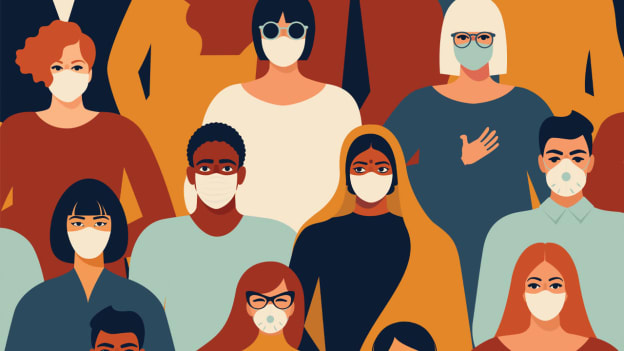Social distancing and the age of the introvert

A lot has been said already and a lot will be said about the way the world will change after the COVID-19 pandemic dies down. In the short term, global economies will face recession, companies will struggle to survive, there would be job losses and many such unpleasant effects. In the long term, consumer habits would change, some industries would become the new superstars while some would die while others would have to change their business model completely. All these effects are already being researched as I write this and there would be further case studies that will be drawn up by consultants and professors as we continue to see the further developments of this pandemic.
While these changes will be well documented and researched, there is also another big topic that is being discussed - how the way we live life is changing during the lockdown. Today, we are conditioned to be hyperactive – in fact, we celebrate people who show tremendous energy in conducting their business. People write bestsellers on how to keep energy levels high in the high-pressure conditions of today’s business. We often feel as if we are on a treadmill with an ever-increasing speed where one needs to run to stay at the same spot. And now imagine this treadmill suddenly stopped while you are still running at top gear! Some people are holding onto the handrails of the treadmill to keep themselves from crashing on the console while desperately willing their bodies to come to a screeching halt while others are hurtling headlong to certain collision with a stationary object.
Is there another way to stop this collision? I believe, there is.
In today’s hyper-competitive and the hyper-stimulated world, we are taught and conditioned to make ourselves visible in order to be noticed and hence, successful. We are bombarded with stimuli every moment – emails that need (we tend to ascribe this need to all emails) immediate attention, social media messaging, news that changes by the minute. We invest serious time in burnishing our image in the virtual world as much as the real world. In the real world, there is a strong tendency to act in a way that gets the spotlight on us as we tend to aver by the adage “out of sight is out of mind”. Organizations also encourage people to remain connected through internal social interaction tools like Yammer. This world, we can be forgiven to think, is designed for the extrovert. Extroverts win, introverts just work hard.
This brings me to the often visited debate – if one assumes that becoming a CEO of a company is the dream of every ambitious young man and woman in the corporate world (this is a very broad assumption and would certainly not stand to scrutiny but let’s stay with it for the sake of argument), and then one is asked who has a better chance of being the CEO – introvert or extrovert – then answer most likely would be a resounding vote for the extrovert. An extrovert is the one who is great at building relationships, meeting people, being extremely social, life of a party. An introvert is typically the quiet one who thinks – often labeled as a nerd. This is, of course, a generalization but we shall only use it to drive home a point.
In this debate, many tend to forget one of the greatest strengths of an introvert – reflection. Reflection is a habit that needs cultivation but is the natural strong suit of an introvert. An introvert spends a lot of time with his thoughts. He dreams he imagines, he thinks, he analyses, he hypothesizes, and introspects. While the extrovert is busy regaling the crowd and playing to the galleries, the introvert is busy going deeper into topics. While the extrovert is being the life of a party, the introvert is busy developing a new hypothesis. While the extrovert is thinking how to get most “likes”, the introvert is busy questioning himself and trying to process his feelings and motivations. This is not to portray the extrovert as shallow, but it is trying to describe the way he expends his energy in order to achieve his objectives – be it career or social.
In general, reflection doesn’t get the attention and importance that it deserves as a life skill. We are so focused on getting stuff done and then on getting more stuff done, we just lose sight of the fact that we are just doing things and not really taking stock of where we are reaching. We are told how to be more productive, how to excel in selling, how to make production and supply chain more efficient, how to negotiate, how to strategize but we are rarely told how to reflect. Reflection, in my view, can’t be taught. One needs to learn this by oneself. One needs to learn the skill of being an observer, who can follow a train of thought to its conclusion while getting out of our conditioned state and without being biased. All our thoughts are colored by our experiences and true reflection is the art of shedding our conditioning and looking at an event or decision or thought as objectively as possible. For this, one needs to be highly aware. This is difficult and takes time and practice. An introvert simply has more time and inclination to attempt this than an extrovert.
Enter COVID-19 and social distancing
Apart from all the changes that we are going to witness as a result of the COVID-19 pandemic, one that is going to last for a long time is the concept of social distancing. We are now taught that we need to keep social distancing in order to be safe and keep others safe. Even after the pandemic is brought under control, our inherent insecurity about getting infected and the fact that several stakeholders shall keep this subject relevant will ensure that social distancing is here to stay. Further, any small blip in the radar of social health and the topic will regain its dominant place in the collective psyche. It is not a big leap of imagination to picture a world that is less social, less traveling, less face to face meetings, and more virtual meetings, more online classes, more masks. The skills that the extrovert has assiduously developed in order to succeed in the earlier hyperactive and hyper-stimulated world suddenly seem blunt, don’t they? Where are the office parties to play to the galleries, where are the cafeteria meetings to lobby for your proposal, where are the official dinners to work your charm on customers? I do not intend to say that these would disappear, but it stands to reason that these would be limited as compared to the earlier state of play. What then comes to the fore are thinking and reflecting skills analytical skills as more and more proposals would be won or lost based on firm logic and reason rather than backroom lobbying.
The introvert is simply better positioned to manage this new reality simply because he is comfortable in his own company and can use this to reflect and work winning strategies. Maybe it is time for extroverts to think how they can be better introverts (and this is possible, I think) as we may well be entering the Age of the Introvert
















